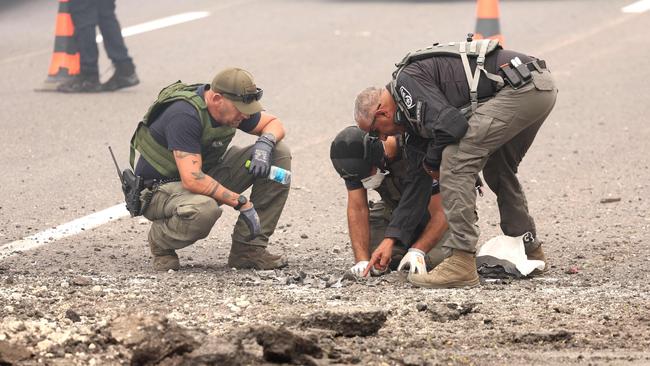
There has been intense dialogue between Jerusalem and Washington over the extent of Israel’s forthcoming ground campaign in southern Lebanon.
Israel’s most urgent ambition is straightforward: to produce a cessation, or sufficient reduction, in Hezbollah rocket fire into northern Israel such that the 60,000 to 80,000 Israelis evacuated from towns and settlements in northern Israel can return home.
Making that change permanent so that Hezbollah rockets do not resume in a couple of months will be intensely challenging for Israel.
No one should ever lose sight of the direct cause of this conflict.
There is no reason at all inherent in Lebanon’s national interest, or Israel’s national interest, for the two nations to have any military conflict.
But Hezbollah, an Islamist terrorist group created by Iran and existing entirely to serve Iran’s interests, has in the past year fired 9000 rockets, missiles and other projectiles in attack of Israel.
These rockets have killed dozens of Israelis. That the number is so low is entirely due to the effectiveness of Israel’s Iron Dome defence shield.
At the same time, Hezbollah made no secret of its intention to launch an October 7 Hamas-style incursion into Israel to torture, humiliate and kill as many Israelis as possible.
No one could possibly imagine that Israel would simply allow this situation to continue indefinitely. Anthony Albanese and Penny Wong have repeatedly and airily said Israel has the right to defend itself against Hezbollah.
How exactly do the Prime Minister and Foreign Minister propose Israel should do this other than through the integrated campaign it is running now?
This is a tragedy for Lebanon, but the moral responsibility for this tragedy rests entirely with Hezbollah.
Israel took its eyes off Gaza last year partly because its gaze was so intensely focused on Hezbollah and southern Lebanon.
Its campaign has been technically astonishing, beginning with the exploding pagers issued to Hezbollah operatives, followed up by the exploding walkie-talkies, and then a highly targeted air campaign that destroyed enormous quantities of Hezbollah munitions, but more importantly also killed Hezbollah’s entire senior leadership.
The Israeli ground campaign will aim to clear Hezbollah out of as much territory as is possible adjacent to Israel’s border with Lebanon.
In an international agreement pursuant to a unanimous UN vote in 2006, Hezbollah was supposed to stay away from the Israeli border, beyond the Litani River 30km north of Israel.
It was also supposed to recognise the sovereignty of the Lebanese national government and allow the Lebanese national military to exercise a monopoly of military force within Lebanon.
But Hezbollah and Iran both have nothing but contempt for Lebanese sovereignty and they didn’t honour this agreement for a single day, though Israel’s last big military campaign in southern Lebanon did buy it some years of relative peace.
The Biden administration wants to keep the Israeli ground operation as limited and short term as possible.
US Defence Secretary Lloyd Austin has, however, now explicitly said the US supported Israel’s campaign to remove Hezbollah infrastructure from areas near the Israeli border.
Does the Australian government share this view? It’s very unlikely we’ll ever know.
Despite all the momentum Israel has built up, any ground operation is intensely dangerous for the Jewish state.
It’s also the case that Hezbollah retains thousands of rockets.
Most of Hezbollah’s longest range and most heavily armed rockets have not been fired. Whether this is because Israel has destroyed many of them or, more likely, the Iranians are telling Hezbollah not to fire them because, for tactical reasons, they don’t want to provoke an even bigger military engagement now, is unclear.
There’s also always a possibility that one or more such rockets will get through and cause big damage, even in Tel Aviv.
Finally, while Israel is being criticised by the usual suspects in the West, much of the Arab world is delighted that Hezbollah is being reduced.
The Saudi media, for example, has argued that Hezbollah has acted in service of Iranian rather than Lebanese interests and caused great suffering for the Lebanese.
This conflict now moves into perhaps its most dangerous phase.




Israel now enters a newly dangerous phase in its dreadful but necessary military campaign against the Lebanese Shi’ite terror group Hezbollah.